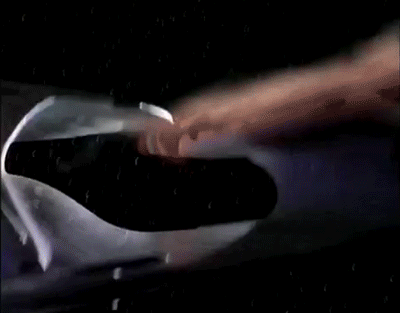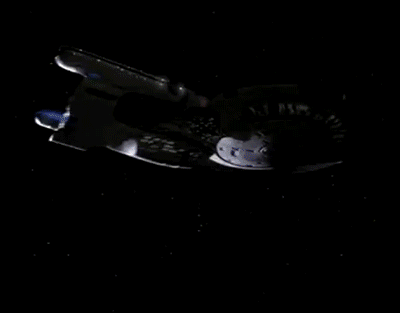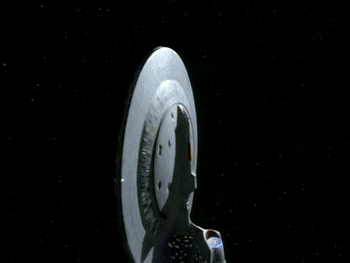The recent passing of the 30th anniversary of Star Trek: The Next Generation’s premiere got me thinking about which episodes of this terrific series are, simply, the best. Now, TNG had 178 episodes (as did DS9 and VOY), so this list took a bit of research to pull together, though I was surprised at how many of these top 10 I could easily recall without any digging whatsoever. Disclosure: I am well known to go back and watch these episodes quasi-regularly because I like them so much.
What makes a “best” episode? Any number of factors that I cannot easily parlay into an explanatory paragraph. Instead, I hope to provide adequate explanation in the description for each entry.
Without further adjustments to the warp core, let’s…
ENGAGE

- Cause and Effect (Season 5, Episode 15)
Let’s kick things off with some time travel, shall we? “Cause and Effect” is, of course, the episode notable for starting out like this:


To start the show with the utter destruction of the Enterprise creates such a wonderful number of questions, which the show handles marvelously by simply dumping us into a normal day of operations an instant later. Time travel gets used a lot on the various Trek shows, but often isn’t used all that well.
I am something of a stickler for time travel in science fiction: if you’re going to use it either use it responsibly with solid rules or just don’t use it at all. This episode is one of the best uses of time travel in all of Trek because it creates a simple problem: you are trapped in a loop reliving the day leading up to a mortal catastrophe over and over again. How do you break free? How do you even recognize that there’s a loop?
The iterative changes to the same day occurring repeatedly build suspense until, along with Data, you recognize the answer to the problem at the same moment. It’s suspenseful but also just a good science fiction story. There are a lot of great episodes that didn’t make it on this list in favor of this one―episodes with better stories or more impactful allusions―but “Cause and Effect” makes it on the list for simply being one of the most fun episodes in TNG’s library.
Deal with it.

- Yesterday’s Enterprise (Season 3, Episode 15)
Otherwise known as “that episode with the shiny belts” or “the one where Tasha comes back,” “Yesterday’s Enterprise” is another good time travel piece built around the idea of what would change if a single important block was removed from the Jenga tower of history.
Many people would have this episode in their top 5 (even their #1!), but I’ve never been quite as crazy about it as them. Sorry! That said, it is one of the greatest TNG episodes by virtue of good storytelling, good acting (Picard’s “things are going very poorly for us” speech), and simultaneously sending off Denise Crosby (Tasha) properly while also introducing a shocking plot point later in the show’s run.
Additionally, it does something all good history-shuffling time travel scifi should do and shows us the perils of heroes gone missing. The galaxy without the Enterprise C’s sacrifice at Narendra III is one of war and horror. Making the sacrifices necessary to amend time and believing that things could truly be better are great messages of hope.
Finally, fun fact: this episode was originally going to be WAY MORE GRAPHIC. They were gonna decapitate Wesley! Fry Data! Show Riker dying brutally! All at WORF’S HANDS!
WHAT.
- All Good Things (Season 7, Episodes 25 & 26)
AKA: “the one with old everybody,” “the one with Q’s perfect delivery of the word ‘goo,’” “the one where the Enterprise gets a death cannon.”

The finale of TNG had to make this list. I’m quite picky about show finales, as they bear massive weight for the longevity of the show in question. Sure, a great show with a bad finale is still a great show, but the crap finale will always stick with you because it’s where the characters have been left. It’s the moment that determines what hope you have for them going forward (if any).
“All Good Things” does TNG justice as a finale.
Another time travel episode in its own way, “All Good Things” allows us to see where TNG started, where it currently is, and where it’s characters are going. Q returns with some terrific dialogue and scene-chewing, bookending the series marvelously.
The best part, however, is at the very end of the episode when Picard sits down to play poker with the rest of the senior staff. You feel the camaraderie between the actors, you feel the significance of the 7 years that have come before, and you believe in the hope that these individuals will make better choices than those that led them to the broken future seen earlier in the episode.
Which is exactly what happens 🙂
- Chain of Command (Season 6, Episodes 10 & 11)
AKA:

Sometimes (or maybe often), the best episodes of a show aren’t the ones that are the most fun. Sometimes they’re the episodes that most challenge our preconceptions, ideas, and beliefs, forcing us to reevaluate our position on an issue or issues. “Chain of Command” is such an episode. Sent on a secret mission, Picard is captured and tortured by Cardassians seeking to gain military intelligence from him. Over the course of this two-parter, we witness what happens to the Enterprise crew when a different captain is in command, and we see a man we’ve come to respect for his strength (among other things) be brought low and nearly broken.
What sticks with me though, past Picard’s defiance in the face of torture, is the little conversation he has with Troi at the very end. She’s discussing how very difficult it will be for him to process what he’s been through, and he reveals that, in the end, he really did see five lights though there were only four. The torture had truly harmed him and damaged his psyche; only his sheer willpower gave him the ability to remain defiant. As a proud supporter of Amnesty International, Patrick Stewart put a large amount of research and effort into this episode’s portrayal of torture.
It shows.
- Sins of the Father (Season 3, Episode 17)
While it still lived largely in the world of “every episode returns to the status quo,” TNG did have a number of series-arching plot threads that would pave the way for shows like DS9, where basically the last 4 seasons were one overarching plot thread. Perhaps the best of these threads follows the Klingons as they rise from the “black hat” of The Original Series to become a relatively complex culture in TNG. “Sins of the Father” is the episode that launches all of those threads, not to mention the massive Klingon plotlines of DS9’s later seasons (which are also GREAT).
Worf learns that he has a brother―after thinking his entire family died when he was a child―but more than that, he learns that his father has been accused of treason leading to the death of thousands (plus his own). What follows over the next hour is a conspiracy that sought to place the blame on Worf’s family because he lived among humans in lieu of placing the true blame on a family so powerful that accusing it of treason would tear the Klingon Empire apart.
More importantly than that, however, this episode provides the first major inroads for Worf as a character that would go on to be the most appearing character in ALL of Star Trek, not to mention the biggest building block to the deep friendship he and Picard come to have.
It’s good scifi, redeems the Klingon race from TOS, and gives us terrific character plotlines for seasons to come.

Conclusion
Well, if you’ve read this far, congratulations! You now know way more about my Star Trek thoughts than most. In any event, we’ve come to the end of this list, with the Top 5 to be a separate post next week. Make sure to bookmark this blog, follow me on Twitter (@Dreamertide) or Twitch (BastianGrim), and come back next time for more talk of writing, science fiction, and random musings!
For more content right now, check out the main page HERE.
Thanks for reading!
